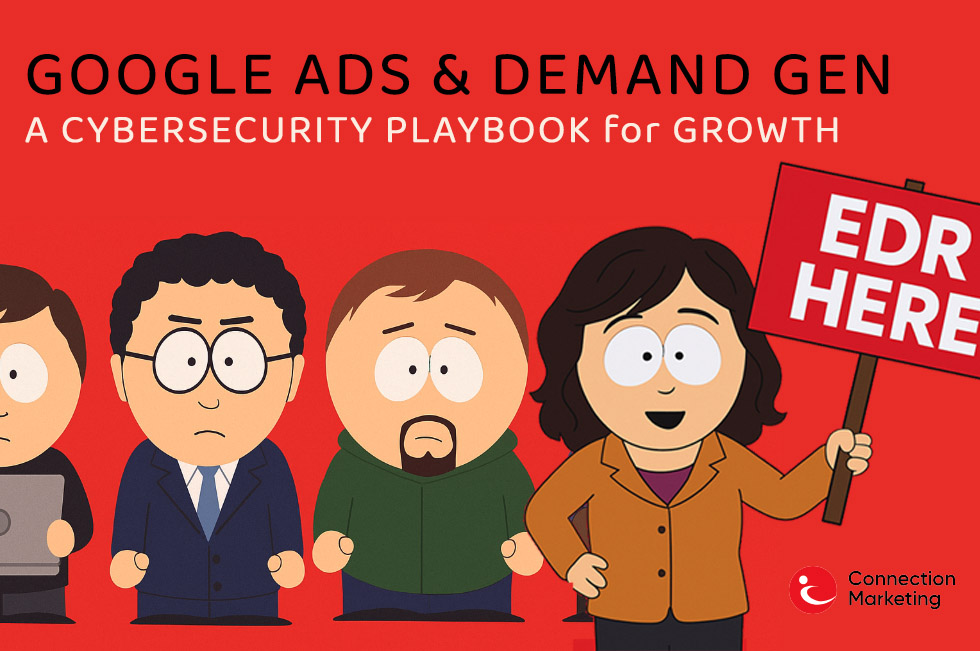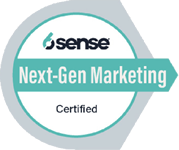Let’s face it, getting customers to book directly at your hotel is an uphill battle in 2019. OTAs (online travel agencies) and metasearch are the name of the game, because from a consumer perspective, using them makes finding a booking easy. Customers can enter a query into one customized search engine; apply filters for location, timeframe, and price; and get results tailored to their needs, from which they can immediately book their reservations. Using these sites makes comparing and contrasting easier, enhances the research experience, and reduces the amount of time needed to find the ideal hotel. From the perspective of a hotel owner or manager, however, the situation is not as clear. The advantages of having clients find and book you through an OTA come with some significant downsides in terms of cost and control. Here’s why it’s to your benefit to look at increasing your direct bookings, and how you can do so.
You’re probably already familiar with online travel agencies such as Expedia or Travelocity. These are massive online directories consumers can search to find bookings from hotels, cruises to private jet charter services like Jettly that have partnered with them to offer listings through their sites. OTAs regularly come up first in search results because of their volume and popularity, and are the first stop for travel research for many consumers. When a consumer makes a decision, they book directly through the OTA without going to your website. Metasearch engines such as Hipmunk are somewhat different. These specialized search engines compile similar travel information. However, once the consumer is ready to buy, they’re redirected to another website to reserve the booking, such as a hotel or airline’s site or an OTA.
Partnering with these companies can help your hotel’s marketing efforts, because it puts some of the burden of marketing costs onto OTAs, and can put your name in front of potential customers who wouldn’t otherwise see you. Some customers will even visit a hotel’s website and book directly after first seeing it on an OTA or metasearch.
However, before you surrender your booking process to OTAs, be aware that the downsides can potentially outweigh the benefits. OTAs charge up to 25 percent in commission for a booking. Metasearch engines usually take a smaller percentage, but often they’re cutting a deal with an OTA that holds your listing, not you—which means you’re still paying the hefty OTA commission. Neither provide hotels with any data on the consumers who are booking with them, and some agreements prohibit hotels from following up with guests who book through their platform. This makes it nearly impossible to establish an online relationship with your guests.
Those aren’t the only disadvantages. The generous cancellation policies offered by many sites increase the rate of bookings that fall through. The average cancellation rate for bookings through OTAs is 40 percent, as compared to 18.2 percent for direct bookings. Given OTAs’ dominance in the market, it’s difficult for hoteliers to push back against no-penalty policies that make it easy for consumers to cancel at the last minute. Most notably, OTAs will require you adhere to a price parity rule in their contract, prohibiting you from undercutting them with a lower price directly on your website, but allowing them to undercut you if they want.
Those factors might not be so bad if your hotel wasn’t losing 25 percent of its revenue on each third-party booking. It adds up quickly. Say you book 10 rooms for one night each at $100, 3 directly (100 percent revenue) and 7 through OTAs (25 percent commission). Your hotel would net $825 for those 10 rooms. If that split stayed the same for every $1,000 in rooms sold, your hotel would dish out 17.5 percent of its potential earnings to third parties. At $1 million in revenue, which isn’t much for a hotel, you’re paying $175,000 for the support of OTAs. Clearly, if there’s an efficient way to shift more sales from OTAs and metasearch engines to direct bookings, it is in your best interest to pursue it.
To encourage potential customers to book directly, you may consider to use an accessible payment solution. Discover the cheapest card payment machines with our comparison tool. You may also need to optimize the consumer experience through your own website. Here are the 5 ways you can increase direct bookings and avoid paying OTA fees:
1. Create a stellar mobile experience on your website
2. Use live chat and AI messenger bots for faster engagement
3. Drive traffic to your site with Google Hotel Ad Campaigns
4. Create a hotel guest-retention marketing strategy to increase repeat visits
5. Reward direct bookings with free perks
1. Create a stellar mobile experience on your website
The majority of consumers nowadays are researching and purchasing trips through their smartphones. However, according to PhocusWright, only a small portion of mobile hotel sales are done through hotel websites. Why? People have limited time to make decisions and bookings, which means they’ll quickly abandon sites that don’t load quickly or that are hard to read or navigate. To draw in customers who’ve found their way to your site, you need to make it as easy as possible for them to reserve a booking right from their cell phones.
Having a good booking engine is essential to achieve this goal. Searching Google for “hotel booking engine software” will give you options to compare for your hotel’s website. Look for software that allows site visitors to easily set parameters for their needs, includes fast-loading pictures of rooms, and is optimized for use on a cell phone (essential!). If prospective customers have a hard time finding a good room or have to wait too long for your website to load, they’ll leave and find an alternative.
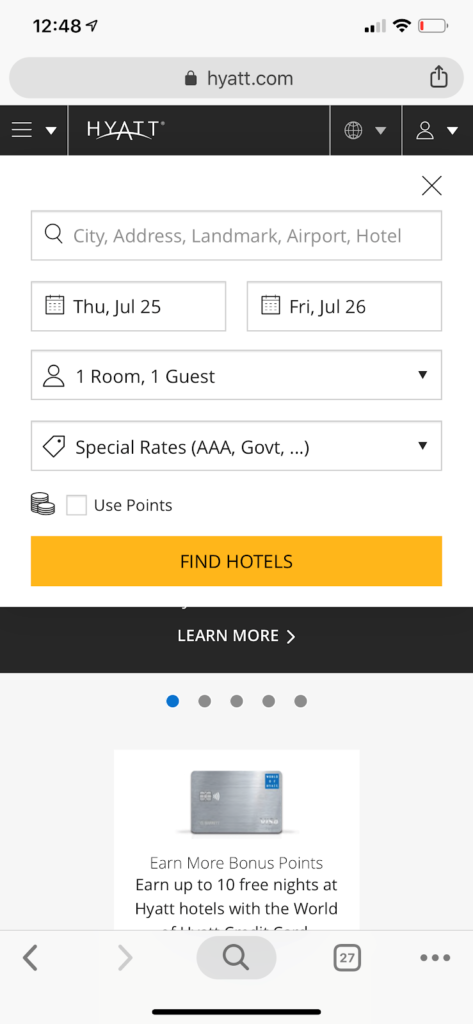
Searching for a Hyatt hotel room directly from their website—easy, sleek, and optimized for mobile use.
2. Use live chat and AI messenger bots for faster engagement
As technology advances online, customers increasingly expect an interactive, personalized experience that delivers answers and solutions quickly. Live chatbots allow companies to increase their availability to customers, creating an opportunity where individual hotels can outperform OTAs through direct customer support. After all, potential guests usually have many questions about how the hotel they’re considering can accommodate them, and are likely to be impatient about waiting for answers. Providing instant access will give them a positive impression of your hotel and increase the likelihood of a booking.
A great strategy is to use a Messenger bot that syncs up with your Facebook business page. The bot can be implemented straight into your website to address any website visitors. This gives visitors a way to get questions answered around the clock. For example, if they need information on a hotel room or policy during the day, you can have a customer support rep answer, but outside of normal operating hours, an AI interface can handle standard queries. Customers won’t have to call and wait to hear back, thus saving them time and enhancing their customer service experience.
Of course, the most important feature to focus on is still direct bookings. In fact, some big hotel chains are already using bots to enable such bookings, along with answering queries, making service requests during a guest’s stay, and more. As people become more comfortable with interacting with chatbots for a variety of tasks, the strategic use of automation can enhance your relationship with your customers.

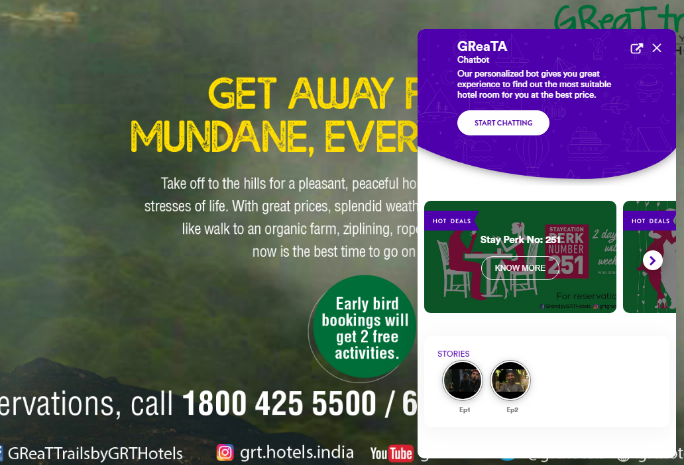
GRT Hotels in India offers an interactive experience on their website with an AI messenger bot.
3. Drive traffic to your site with Google search and hotel ad campaigns
The biggest obstacle to boosting direct bookings is getting visitors to your site in the first place. Without prior knowledge of you, how are people going to consider what you have to offer? You need a way to be visible online to travelers who are searching for a hotel like yours. That’s where online hotel ads come in. A hotel marketing strategy designed to bring your hotel up first in search results allows you to draw potential customers in. Paired with an updated and mobile-optimized website, this allows you to create a great first impression and grab that booking.
Two types of strategies are particularly effective in bringing traffic to you. The first is to use Google Search Ads. A good hotel marketing campaign targets people with an interest in visiting your area and includes captivating call-to-action headlines that motivate customers to click on the link. It also pinpoints keywords a prospective customer might use on Google. For instance, a traveler looking for a room in San Diego might search “best hotels san diego,” or “hotels near me” if they’re already in the area.
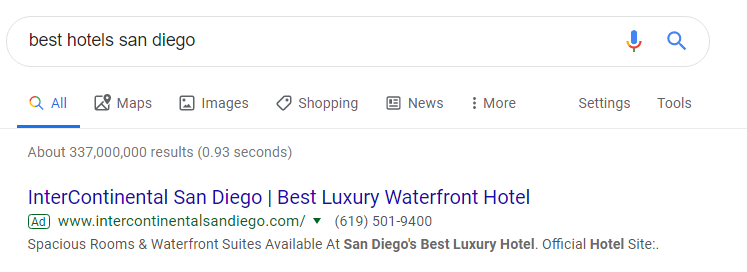
A Google Search ad from InterContinental in San Diego—someone with no particular interest in a specific hotel now has the option to view hotel rooms directly on their site.
Once you’re generating more traffic to your website, you then have the ability to remarket to these website visitors with Google display ads on other people’s websites. Here you can show gorgeous images of your hotel and list key features to remind potential guests of your amenities. When customers see images of you at the moment they’re making a decision, they’re more likely to visit your website and make a booking. You also benefit from giving them a side-by-side comparison, a feature they’re used to getting on larger search engines.
The second strategy is to list hotel rooms in Google Hotel Ad Campaigns. Now this may seem like ironic advice, considering that the Google Hotel Search platform is basically a giant metasearch primarily displaying OTA listings. However, their campaign bidding fees are much lower than the commissions OTAs charge. More importantly, when you publish a Google Hotel Ad, it will show first, above the OTA listings, giving you the prime spot to capture your audience’s attention.
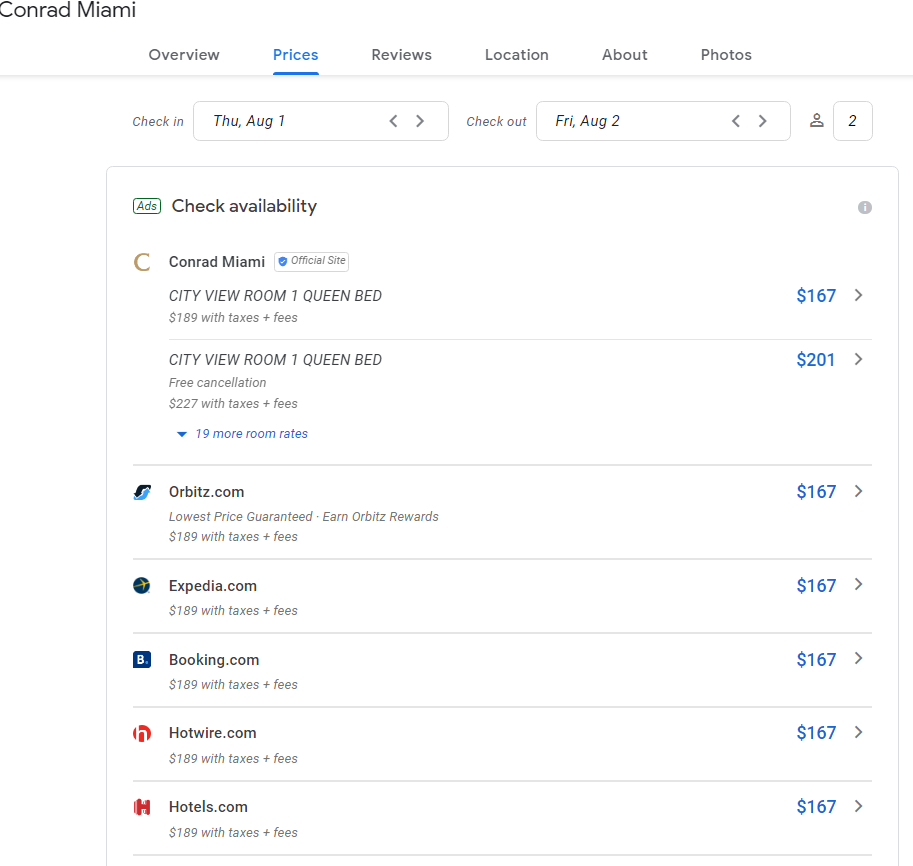
The Google Hotel Search platform will still show OTA listings (they market here too), but it displays a direct booking link first, which is often a guest’s preferred method to reserve a room.
Google is ultimately the biggest metasearch engine available to help people find hotels. In addition to listing room rates, the platform also compiles reviews (Google only, not third-party), displays images, gives users the option to check room availability right from the search engine, and much more. With a large portion of travel researchers finding answers directly from Google, it pays off for hotels to be listed here. You’ll be well-positioned to draw in highly qualified leads who used Google search parameters to filter down and discover your hotel.
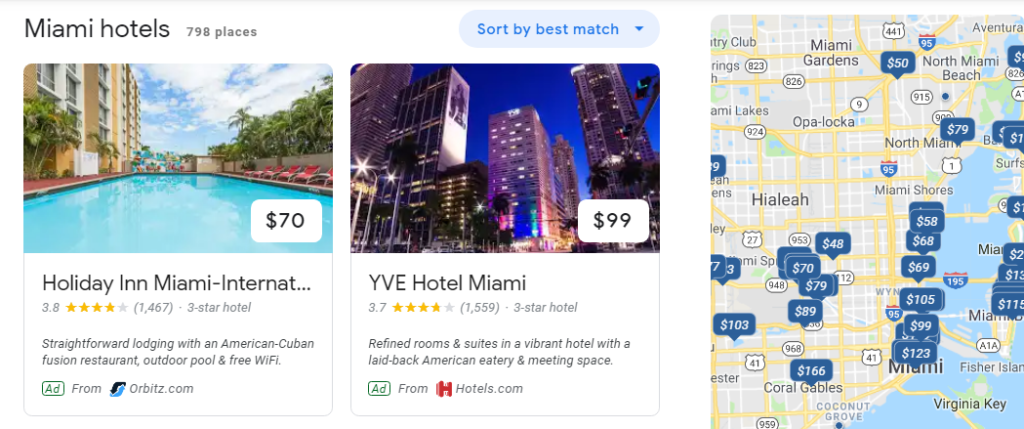
The user experience searching for hotel rooms with Google—all of the same features as a metasearch engine.
4. Create a hotel guest-retention marketing strategy to increase repeat visits
Once guests have stayed at your hotel, you’ll want them to consider a return visit. The ideal result is that next time they’re in your city, you’re the first place they think of staying. With guests’ contact information, you are able to reach out to your customers going forward and give them an opportunity to come back.
Sending emails thanking guests when their stay is over and inviting them to leave a review is the first step to leaving the door open for them to return (so to speak). After that, you can stay in regular contact by keeping past guests up to date on promotional offers, new features such as the addition of a restaurant, networking events, or activities like day tours into the city. Giving away free products such as t-shirts or mugs is also an excellent way for increasing your business exposure on a daily basis, visit to https://blog.goodpromotionalproducts.com/ to read more. If you can remind them of their previous good experience with you, they’re likely to value that and book with you again the next time they’re visiting, even if you’re not the cheapest option.
Of course, in order to execute this plan you must obtain your guest’s data in the first place. Here are a few examples of how hotels can do this:
- Require a guest check-in with email
- Offer free WiFi to hotel guests with a room number and email login
- Offer opt-in email and text notifications for event and dinner specials during their stay
- Offer future stay discounts and perks through a loyalty or referral program (this is particularly effective in enhancing word-of-mouth marketing to friends of past visitors)
5. Reward direct bookings with free perks
Online travel agencies can offer bookings, but as a hotel owner or manager, you create the experience for guests during their stay. As such, you have the leverage to offer services and amenities that an OTA cannot as incentives for customers who choose to book directly through your site. (Do keep in mind that many OTAs will negotiate with you to add perks to their bookings as well). Some additional add-ons to consider when enticing consumers to book directly with you are:
- Breakfast buffet
- Complimentary bottled water in the room
- Early check-in
- Room preference (such as one with a better view, provided it is in the same tier as the one purchased)
- Room upgrades on check-in (when available)
- Reduced-fee or free parking
- Taxi service (a complimentary Uber or Lyft within a short radius of the hotel)
- Discounts with local vendors (restaurants, entertainment, nearby shops, etc.)
While some of these possible add-ons may not be free for you, they are likely to be less expensive than an OTA’s commission. Noting these features directly on the hotel booking page is a highly effective way to let last-stage buyers know they’re getting special treatment by booking through your site. This can also boost your word-of-mouth marketing, because visitors who enjoyed these perks will tell their family and friends that they received them by booking direct.
Conclusion
If you’re frustrated by the amount of money you’re losing to OTA bookings, as well as the loss of control imposed by following their contract requirements, creating a system to increase direct hotel bookings can help. With effective implementation, you’ll see a higher profit margin and regain the ability to talk directly with your own customers. However, making such a plan work takes hard work and diligence, and will likely require upfront costs. In addition, you’ll need to determine which of the options presented are most cost-effective for drawing in guests and increasing profit.
If you’re not sure where to start, don’t worry. Connection Marketing is your expert resource for digital marketing in the hotel industry. We can analyze your hotel’s needs, create a customized marketing plan from the ground up, and follow through with all the necessary resources to carry it out. For a free consultation, contact us at info@connectionmarketing.net or (818) 610-1092.

